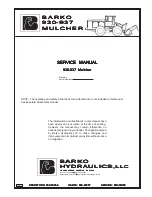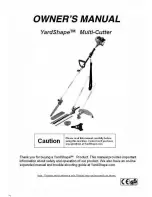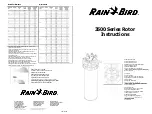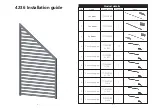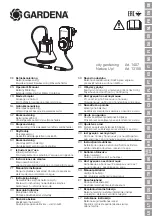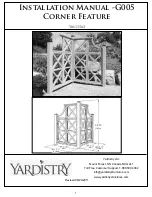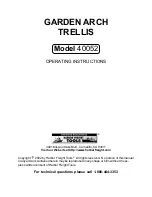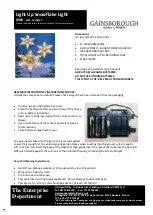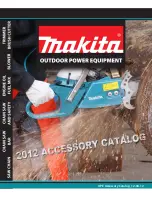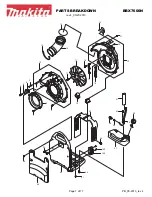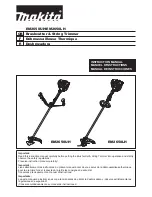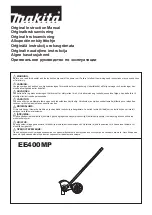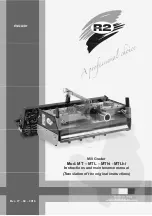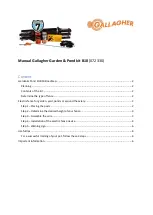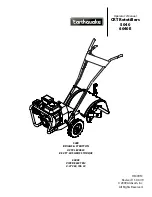
amount of backpressure needed to close
the diaphragm.
5. Turn off water supply and remove bonnet
for possible debris or damage causing the
diaphragm to stick open.
Leakage.
1. Disassemble parts and inspect
o-rings/sealing surfaces for damage.
Check replacement parts exploded view
for missing or replacement parts.
Accessories or persistent problems.
1. Refer to the appropriate installation and
operation manual for specific trouble-
shooting procedures
2. Inside the US, please call the Rain Bird Spec
Hotline at (800) 458-3005.
3. Outside the US, please refer to the back
page for contact information.
4. Always visit us at www.rainbird.com.
Thank you for purchasing a Rain Bird G4
Solenoid. This solenoid assembly is compat-
ible with the following Rain Bird valves: PGA,
PEB, PESB, EFB-CP, and BPES.
To use this guide, fold out the back page for
visual reference then turn to the appropriate
language. Follow the alphanumeric referenc-
es for installation, adjustment, troubleshoot-
ing and replacement parts. Specifications can
be found on the back of the foldout page.
Installation
Refer to F1.
1. WARNING: Turn off water supply and dis-
connect all electrical power sources.
2. Turn the solenoid counter-clockwise to
remove the G4 Solenoid.
l
B
3. If desired, use an open-ended wrench to
counter-clockwise remove the solenoid
adapter.
l
C
Clockwise replace solenoid
adapter into valve bonnet
l
D
ensuring
the o-ring does not become pinched or
damaged.
4. Clockwise thread replacement solenoid
l
B
into the solenoid adapter.
l
C
5. Clockwise tighten the solenoid.
l
B
6. Connect one solenoid wire
l
A
to the
controller common wire and the other
solenoid wire to the controller power
wire. Tighten and protect using only
approved watertight connectors.
Electrical Specifications
Troubleshooting
Valve will not open.
1. Ensure main water supply is on. Ensure
upstream valves are open. Ensure flow
control stem is not closed.
2. If valve only opens with manual bleed,
ensure controller is programmed to acti-
vate the proper zone valve. Test controller
power output and service if necessary. Test
solenoid power input.
a) If controller and solenoid power are
detected, insert a thin flat screwdriver
into the slotted areas of the solenoid
bottom and brown solenoid retainer.
Gently pry to disengage retainer.
Remove plunger assembly and clean
debris.
Replace plunger ensuring black surface
faces outward. Snap retainer into place
ensuring the larger hole faces outward.
Persistent problem may be an obstruc-
tion lodged in main pipe.
b) If power is detected at the control-
ler and not the solenoid, inspect and
repair damaged lead wires.
Valve will not close.
1. Ensure controller is not operating the valve
automatically. Ensure manual internal
bleed is off by clockwise tightening the
solenoid adapter. Ensure manual external
bleed is off by clockwise tightening the
valve bleed screw.
2. Turn off water supply and swap solenoid
from an operational valve; replace solenoid
if necessary.
3. Turn off water supply and verify that the
solenoid adapter o-ring is not damaged;
replace if necessary. Check for debris in
solenoid bowl preventing plunger from
creating a positive seal.
4. Check overall system water-pressure
requirements and ensure that multiple
zone valves are not operating simultane-
ously. Disallowing one zone valve to close
before another opens can reduce the
English
A
B
C
D
F1
G4 Solenoid
Troubleshooting (cont.)
• 24VAC 50/60Hz (cycles/sec) solenoid
• Inrush current: 0.41A (9.9VA) at 50/60Hz
• Holding current: 0.14A (3.43VA) at 50/60Hz
• Coil resistance 30-39 ohms nominal



